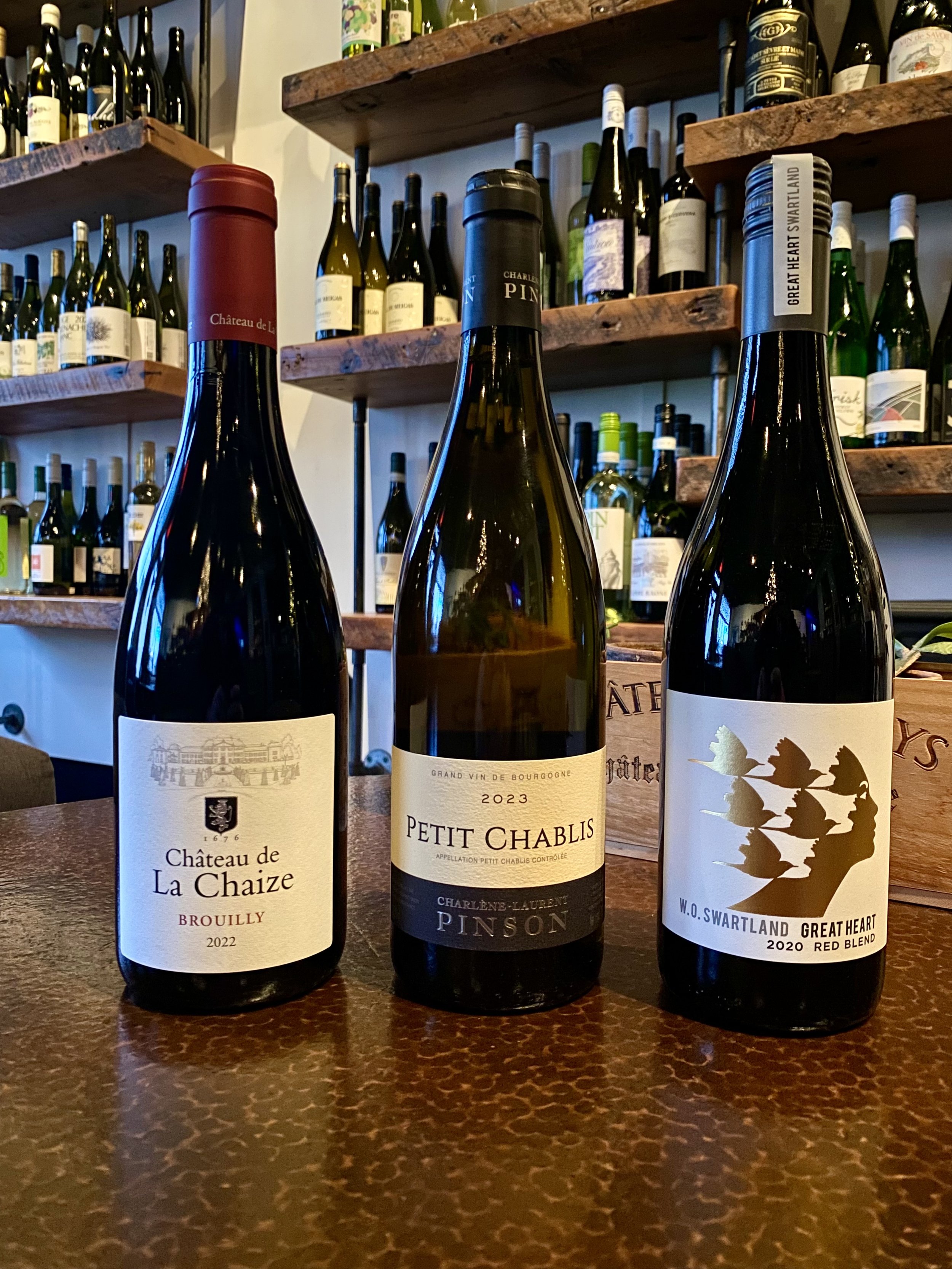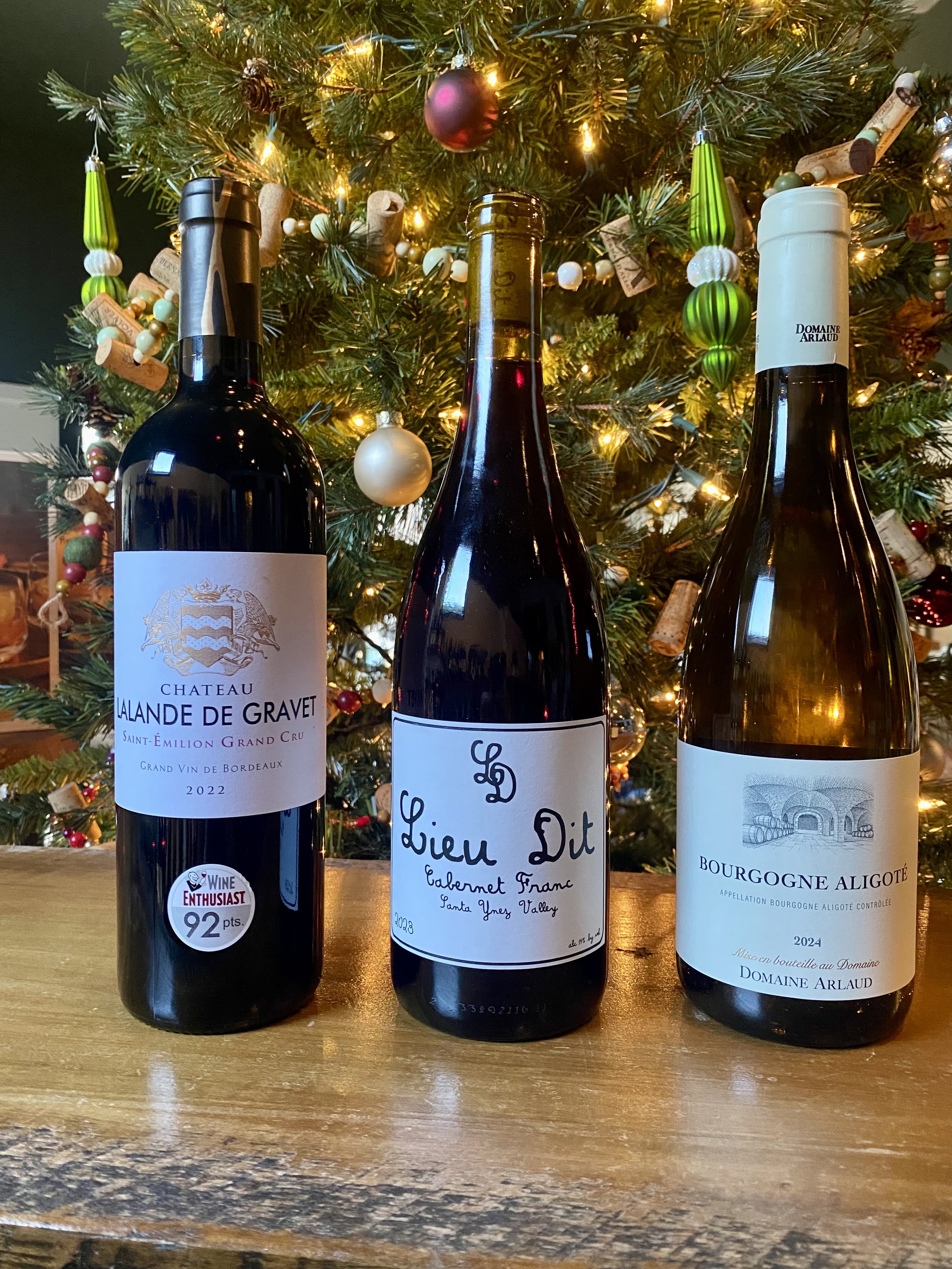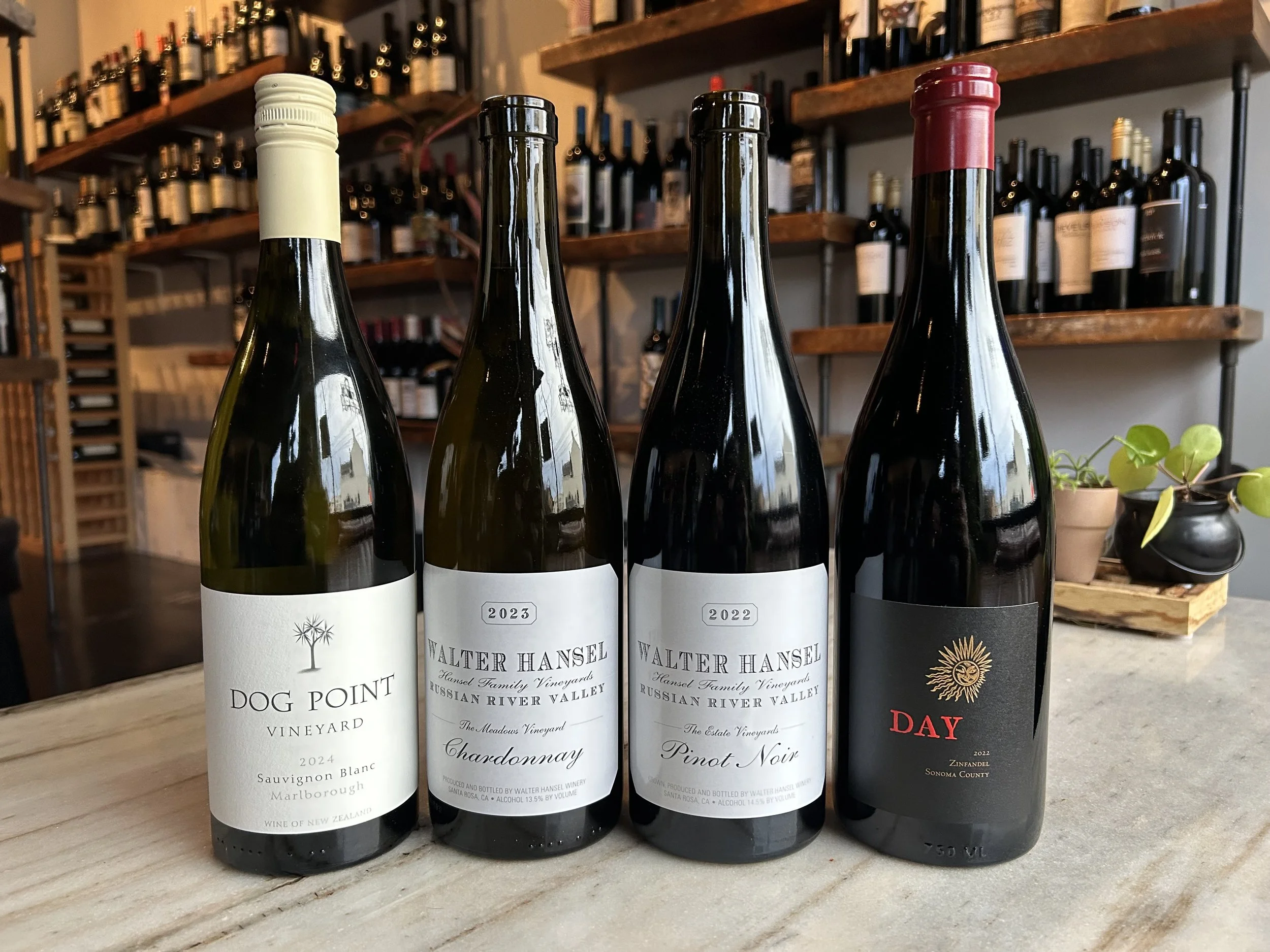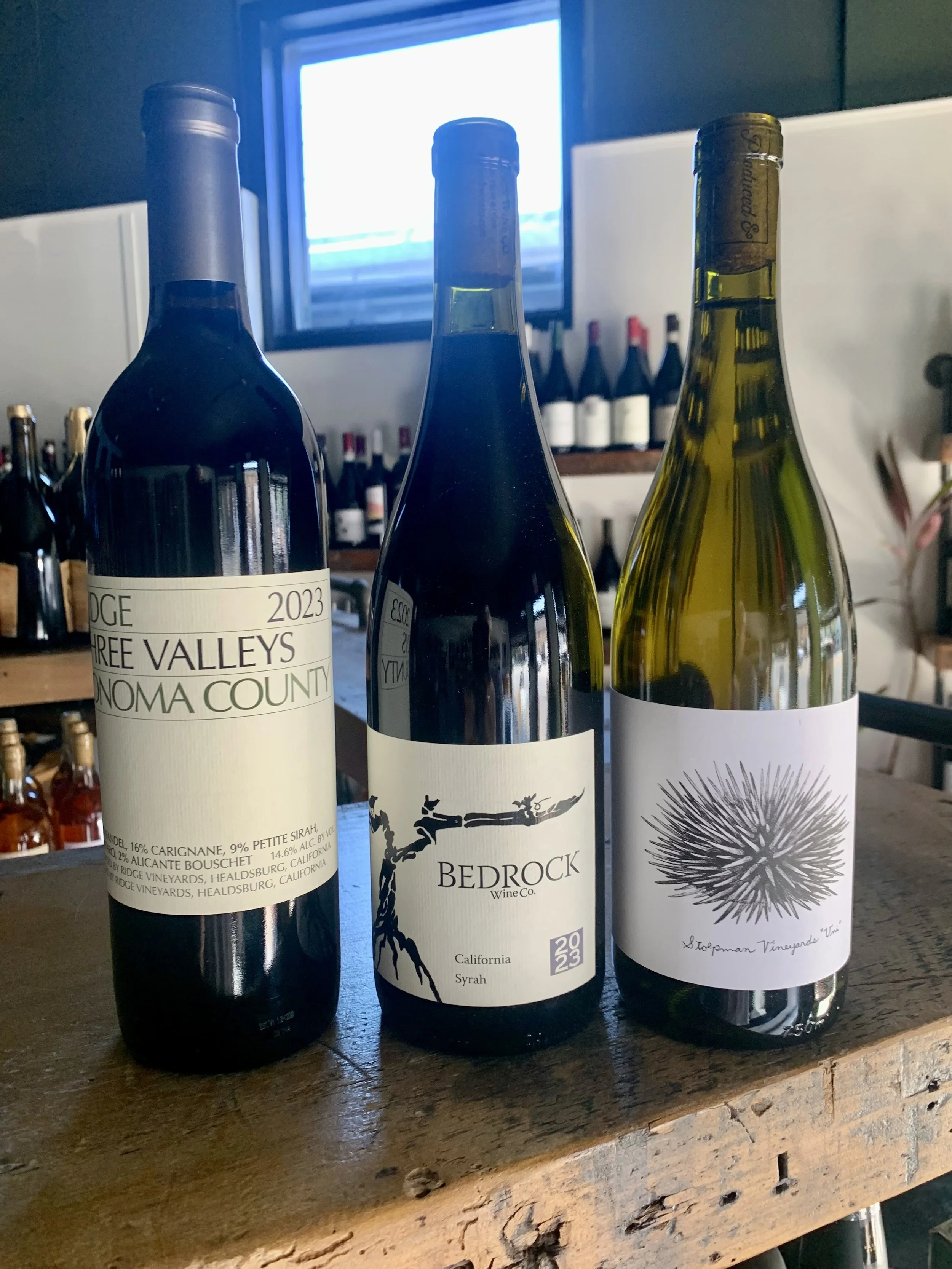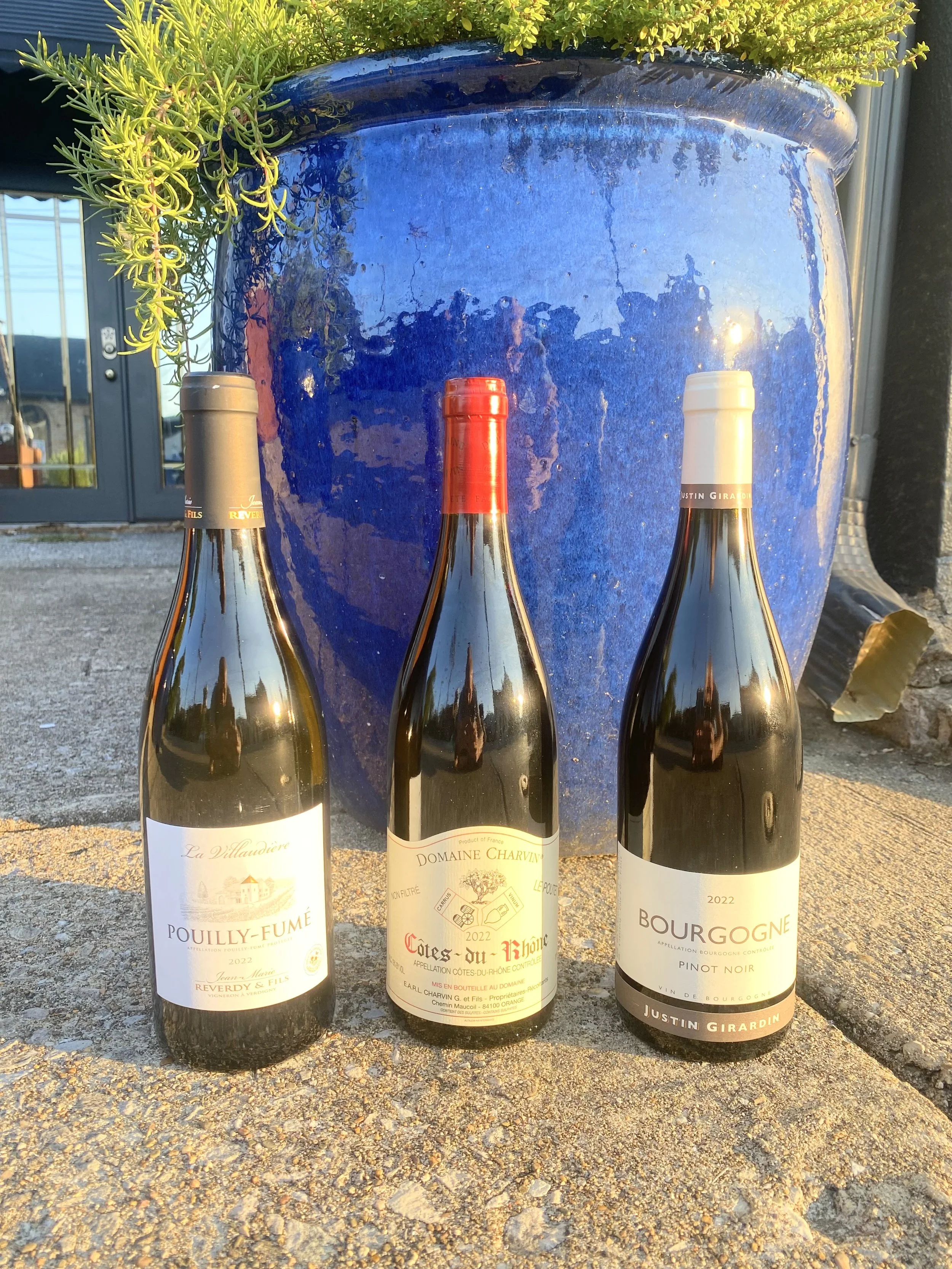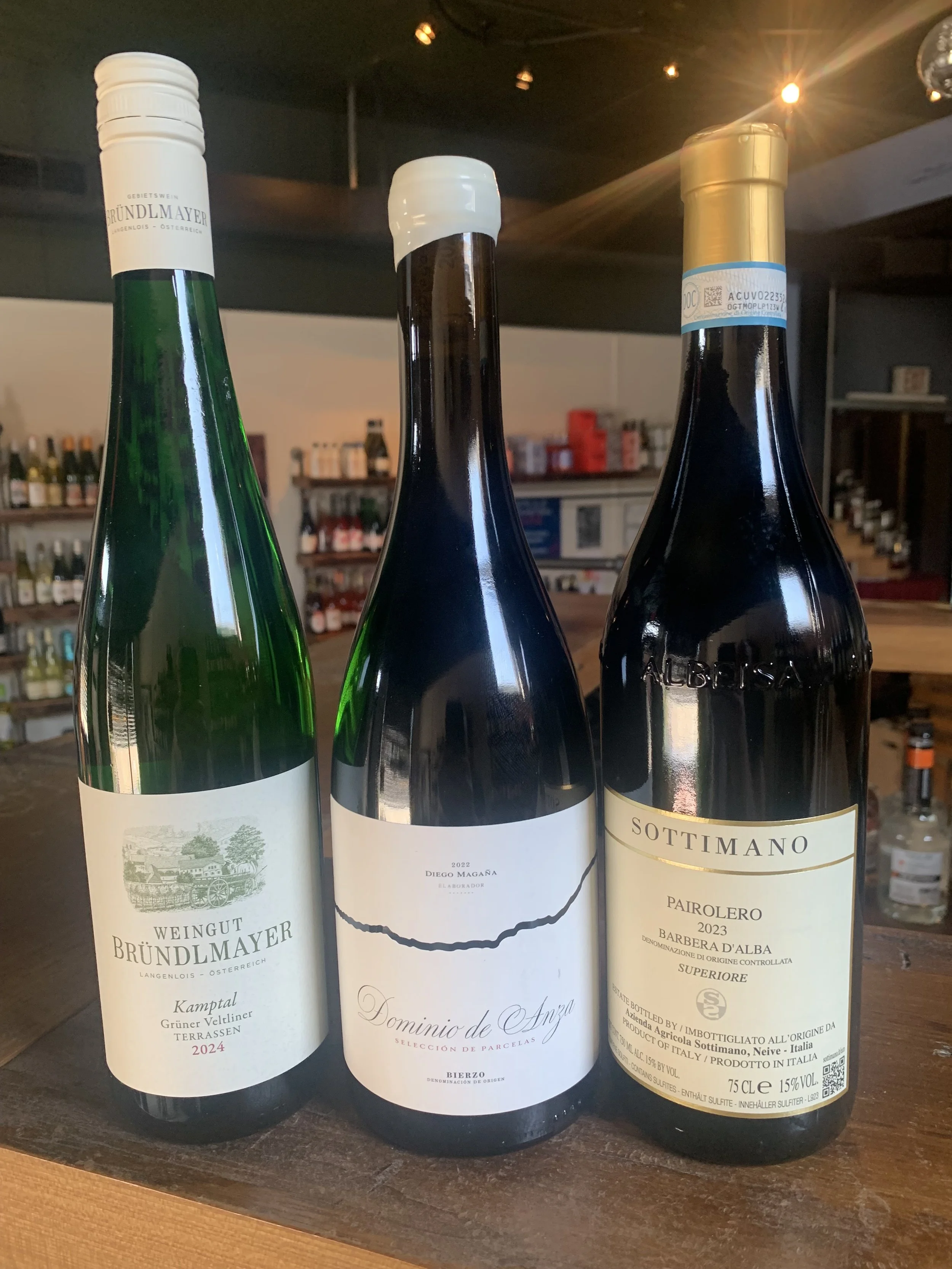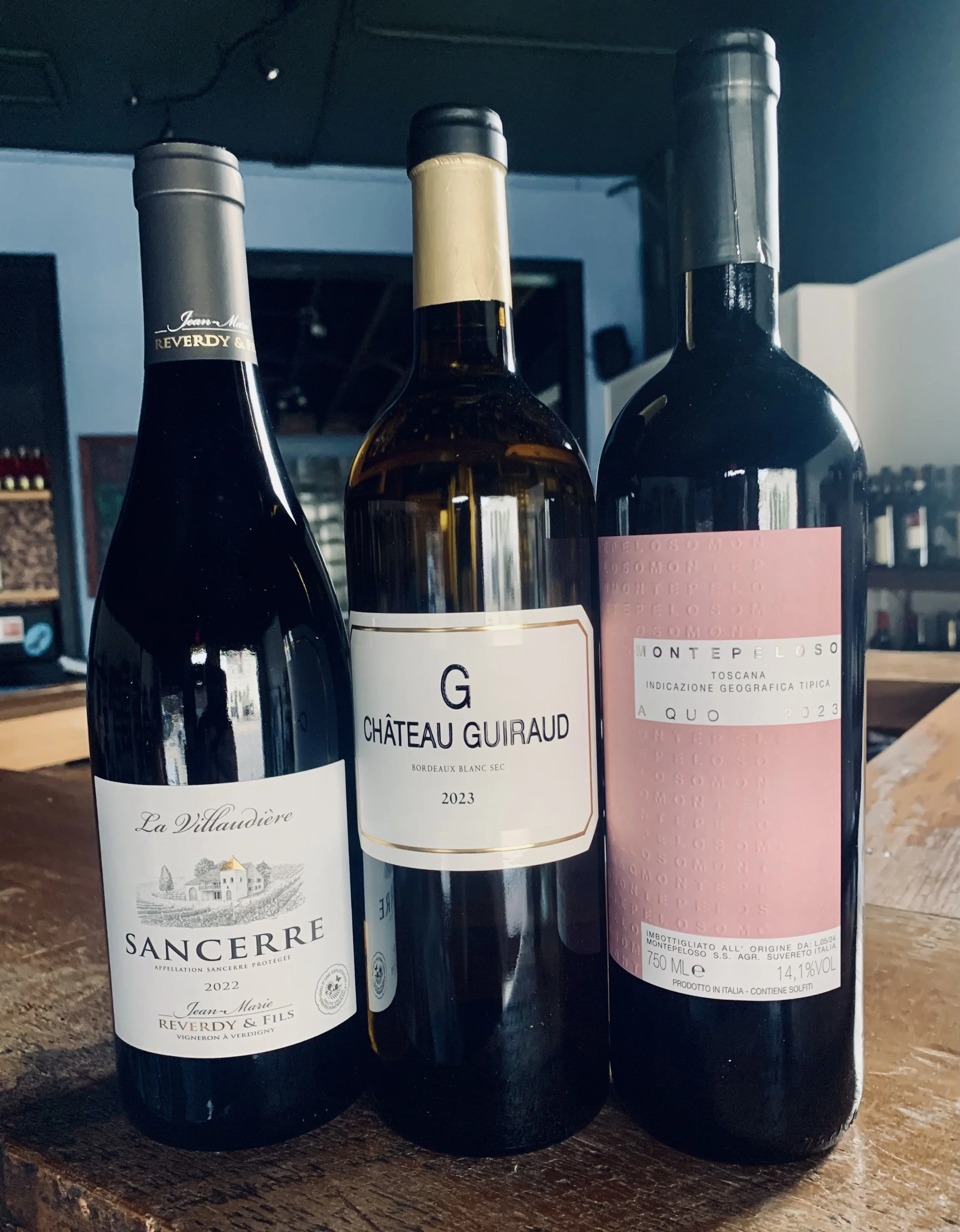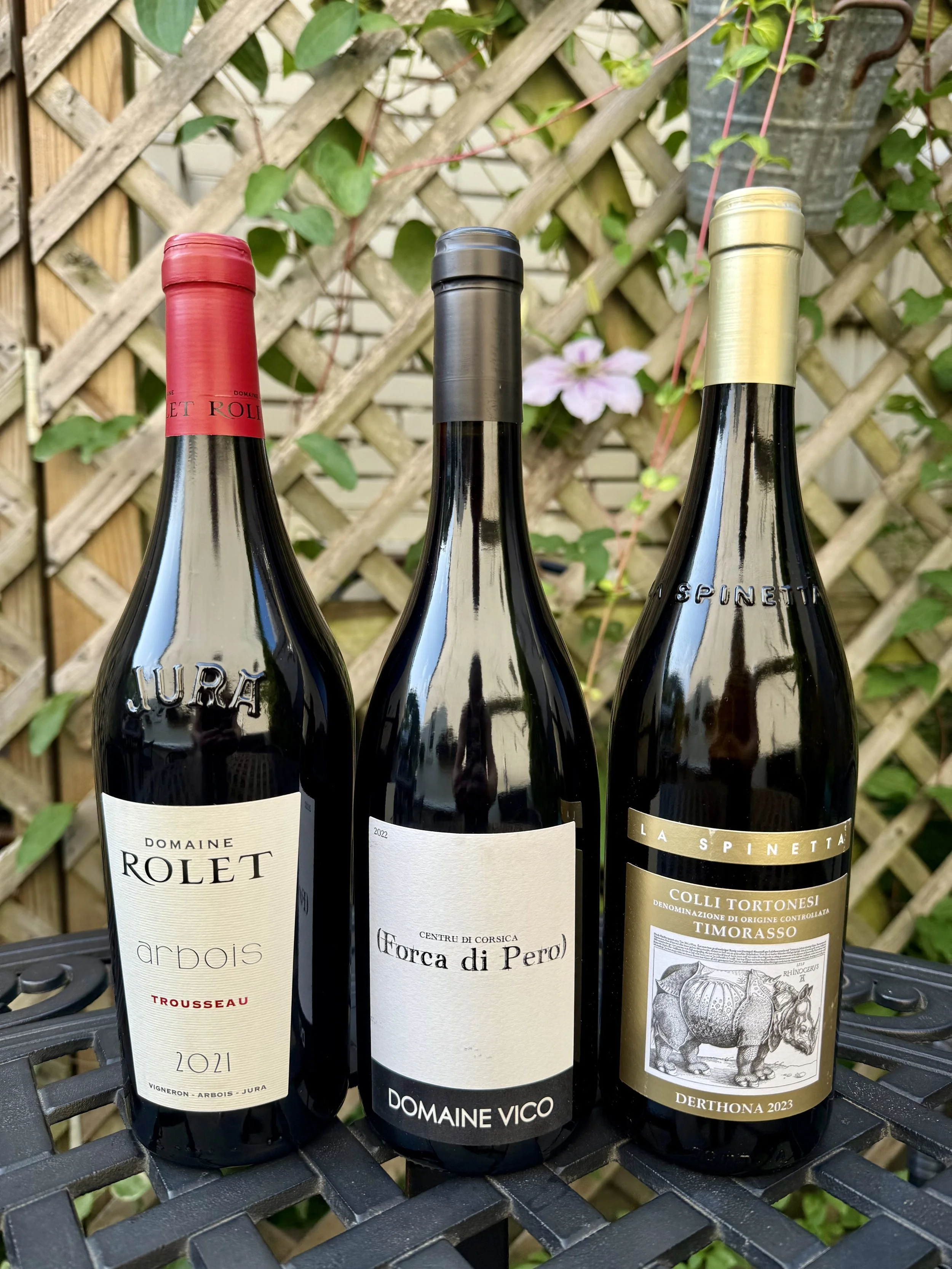
Tasting Notes
Round 8: January 2026
2022 Château de la Chaize Brouilly
When a historic Beaujolais estate that's been making wine since 1671 decides to go full organic and build an underground winery longer than a football field while running the whole operation off-grid, you don't get "nice Gamay" as a result. You get Gamay operating at levels that make Burgundy collectors nervously check their bank accounts. This 2022 Brouilly from the Château with gardens designed by Louis XIV's personal landscape architect is what happens when 350 years of winemaking meets modern ambition that makes Dolly Parton's to-do list look reasonable.
100% Gamay from organically certified vineyards
Semi-carbonic maceration with 10% whole cluster fermentation
Aged 6 months: 50% concrete vats, 50% large oak foudres
13.5% ABV from a scorching 2022 vintage
Best drinking window: now through 2027+
The estate literally grazes sheep in the vineyards and treats wastewater with reeds like some kind of viticultural permaculture paradise
Raspberries, blackberries, earth, and ink layered with orange peel and notes that taste like old bricks fell into a fruit basket and everyone was weirdly into it. The palate delivers what Jancis Robinson's Tamlyn Currin called "plashy juiciness" (which is now your new favorite wine descriptor) wrapped in soft tannins that graffiti the fruit with street-art panache. There's a dark stoniness underneath all that berry brightness that reminds you this came from actual Brouilly terroir, not a laboratory or a focus group. James Suckling noted the wine is juicy and subtle with lively acidity and soft tannins that somehow make "elegant" and "crushable" the same thing. The finish stretches with earthy complexity and makes you wonder why everyone's spending mortgage payments on Burgundy when Beaujolais is out here doing THIS. Pair it with roast chicken, mushroom dishes, charcuterie, grilled salmon, anything from that Thanksgiving leftover situation, or Tuesday night when you need something that tastes expensive but costs like you have common sense.
2023 Charlene & Laurent Pinson Petit Chablis
When a Chablis family that's been farming since 1640 (yes, before America existed) plants Chardonnay vines directly above the legendary Grand Cru Les Clos and calls it "Petit" Chablis, that's not modesty—that's a flex disguised as humility. Charlène and Laurent Pinson took 35+ year-old vines on Portlandian limestone, fermented them with indigenous yeast in stainless steel, and bottled proof that appellation hierarchy is sometimes just expensive gatekeeping with better marketing.
100% Chardonnay from 35+ year-old vines
Grown directly above Grand Cru Les Clos near the village of Fyé
Portlandian limestone terroir with eastern exposure
Indigenous yeast fermentation and aging in stainless steel
No herbicides, no pesticides, just organic methods and Kimmeridgian swagger
Zero oak, zero malolactic—pure Chablis in its most honest form
Citrus (lemon, grapefruit, green apple) meets mineral tension that could cut glass, delivering classic Chablis brightness without any of the oak-induced identity crisis some producers inflict on perfectly good Chardonnay. The palate is crisp and flinty with saline minerality that makes oysters weep with joy, lifted by enough acidity to keep everything taut and refreshing. There's a stony purity here that tastes like liquid limestone filtered through centuries of family knowledge—the kind of wine that proves great farming and minimal intervention can make "entry-level" appellations taste like they're punching way above their weight class. This is what happens when you treat Petit Chablis with Premier Cru respect. Pair it with oysters (obviously), seafood of any persuasion, goat cheese, roasted chicken, butter-poached lobster if you're feeling fancy, or anything that needs bright acidity and mineral backbone without the oak-and-malo fanfare.
2020 Great Heart Red Blend, Swartland
While most wine projects start with "let's make something expensive and exclusive," Chris and Andrea Mullineux looked at their Swartland vineyards and said "what if we made wine that funds our employees' futures instead?" Great Heart isn't just a clever name—it's an employee ownership project where everyone who's been with the winery for 2+ years becomes a shareholder and shares in the profits. The wine itself is 82% Cabernet Sauvignon and 18% Shiraz from 16-40 year-old dry-farmed bush vines, aged 18 months in older French oak, and bottled as proof that doing good and making great wine aren't mutually exclusive.
82% Cabernet Sauvignon, 18% Shiraz from Swartland, South Africa
Dry-farmed bush vines aged 16-40 years across 4 parcels
50% whole cluster fermentation with indigenous yeast
Aged 18 months in 3rd and 4th fill French oak (225L & 500L barrels) and 5000L foudre
4% ABV, employee-owned, and featuring a Cape Wagtail bird label (known for selflessness in South African folklore)
Plums, mulberries, cloves, and black pepper meet lavender-scented dark fruit that Platter's South African Wine Guide rated 91 points while calling it supple with savoury bramble and cassis. The palate is full-bodied but never heavy—just concentrated Swartland sunshine wrapped in smooth tannins and enough freshness to keep everything lifted and compelling. There's peppery Shiraz spice playing backup to the Cabernet's structure, creating a wine that's both generous and restrained, bold without shouting. The older oak adds complexity without overwhelming the fruit, and the whole-cluster fermentation brings subtle herbal notes that make this the most versatile red in your arsenal. This is South African winemaking at its most thoughtful—great terroir, smart winemaking, and a business model that proves wine can be both delicious and meaningful. Pair it with braised short ribs, grilled lamb, herb-crusted beef, game meats, mushroom risotto, or anything that deserves wine with both power and grace working overtime to make the meal legendary.
Round 7: December 2025
2022 Château Lalande de Gravet Saint-Émilion Grand Cru
Right Bank Bordeaux Grand Cru that actually EARNED its title through quality instead of inheriting it from geography. This Saint-Émilion estate sits on the limestone plateau where Merlot and Cabernet Franc meet serious terroir and even more serious winemaking - the kind of bottle that makes collectors nervous-sweat at auctions while you're just here to make your holiday table legendary.
Merlot-dominant blend with Cabernet Franc and Cabernet Sauvignon
Saint-Émilion Grand Cru from limestone plateau terroir
Aged 12-14 months in French oak
Fleshy structure with polished tannins that know how to behave at dinner parties
Best drinking window 2025-2035+
Black cherry, cassis, and dark chocolate layered with cedar, paprika, licorice, and earthy notes that remind you this came from actual rocks, not a laboratory. The palate delivers fleshy structure wrapped in polished tannins that treat your holiday roast like it just won a Very Prestigious Award (possibly major, possibly involving a leg lamp). Bright acidity keeps everything lifted while subtle oak spice and creamy notes add complexity without overwhelming the fruit. The finish stretches with dark chocolate and espresso persistence. Pair it with prime rib, braised lamb, beef Wellington, or anything that deserves wine working overtime to make the meal legendary.
2023 Lieu Dit Cabernet Franc
While other Cabernet Francs are out here trying to be the loudest voice in the room, Lieu Dit's Santa Ynez Valley bottling arrived with that "never big or showy, but bold and bright in all the right ways" energy. From Happy Canyon and Rock Hollow vineyards where warm sunny days meet cool windy nights, this is 100% Cabernet Franc that drinks best with a slight chill and proves why the variety deserves more respect.
100% Cabernet Franc from Santa Ynez Valley, Santa Barbara County
Happy Canyon Vineyard and Rock Hollow Vineyard fruit
Sandy and clay loam soils over alluvium
Sometimes whole cluster fermented, aged in old barrels
Bottled in late spring for maximum freshness
Black cherry, tomato leaf, violets, and graphite on the nose leading to pomegranate, plum, and dried herbs on the palate - the kind of herbal sophistication that makes this the most versatile red in your arsenal. Medium-bodied but never thin, fruity and supple with earthy complexity and smooth tannins that make food pairing effortless. This is Cabernet Franc showing why it's the parent of Cabernet Sauvignon and immediately telling you exactly where it's from without needing to shout about it. Pair it with mushroom risotto, pork tenderloin, roast duck, Christmas ham, New Year's cheese spreads, or that random Tuesday when you need something elegant that just WORKS.
2024 Domaine Arlaud Bourgogne Aligoté
When a legendary Morey-Saint-Denis family known for producing some of Burgundy's most coveted Pinot Noirs decides to make Aligoté from 40+ year old vines, you don't get "basic white Burgundy." You get Aligoté operating at levels that make you wonder why everyone's obsessed with Chardonnay. Certified biodynamic farming, indigenous yeast, zero oak - just old vines, great dirt, and winemaking that gets out of the way.
100% Aligoté from 40+ year old vines
Certified biodynamic farming on clay-limestone soils
Indigenous yeast fermentation and aging in tank
Zero oak, zero malolactic - pure varietal expression
Vibrant, green-tinged, refreshment working two jobs
Citrus (lemon, cassis buds), mineral, fresh, and vibrant with that high acidity that makes Aligoté the oyster's best friend. The palate is crisp and flinty with bright citrus lifted by saline minerality, delivering both refreshment and substance in the same sip. This is what happens when you treat Aligoté with the same care as Grand Cru - a wine that proves great farming and minimal intervention can elevate any grape to greatness. Pair it with oysters, seafood, oily fish, roasted chicken, butter-poached anything, or New Year's Eve celebrations that require something festive and serious without trying too hard.
Round 6: November 2025
2022 Walter Hansel Estate Vineyard Pinot Noir
When Stephen Hansel grabbed cuttings from Tom Rochioli's legendary vineyard back in the day, he wasn't just borrowing DNA - he was stealing fire from the Russian River gods. This Estate Pinot is what happens when you let Rochioli Selection vines bask in Russian River Valley sunshine just west of Santa Rosa, then hand them to a winemaker who makes nine separate passes through the vineyard like a monk illuminating manuscripts one painstaking letter at a time.
100% Pinot Noir from estate vineyards, focusing on Rochioli clone with touches of Swan
Native yeast fermentation because micromanaging nature is so 2003
Entirely destemmed and aged 12 months in 25% new French oak (François Frères), with the rest in one-year-old barrels
Ruby-hued with luminous translucency, like stained glass made of cherries
Bright, precise, and wonderfully energetic with crushed flowers meeting white pepper in a dance-off
This is Russian River Valley Pinot Noir playing its greatest hits at half-volume - all the elegance, none of the shouting. The wine delivers translucent refinement wrapped in notes of cherry cola, baked cherries, clove, and toasted cedar, with a kick of orange peel acidity that makes everything feel like it's levitating slightly off your palate. There's a light gamey note lurking in the background like a sophisticated wild card, while the supple mouthfeel and ripe concentration create that rare combination of immediate pleasure and serious structure. This is the kind of Pinot that makes Burgundy-obsessed sommeliers quietly admit that maybe California has figured something out. Pair it with duck breast, mushroom risotto, or anything that appreciates finesse over force, and watch your guests forget to check their phones.
2023 Walter Hansel Meadows Vineyard Chardonnay
The Meadows sits in a low-lying meadow right next to Santa Rosa Creek, where the soil is so ridiculously fertile that Stephen Hansel has to thin shoots and crops like a bonsai master just to keep the vines from producing grocery-store quantities. But here's the plot twist: all that fertility drama results in the most fruit-forward expression in the entire Hansel lineup. It's 100% Hanzell Selection - yes, that Hanzell, the one that basically invented California Chardonnay - and it's dry-farmed every year because sometimes the old ways are the only ways.
100% Hanzell Selection Chardonnay from the Meadows Vineyard, contiguous to Santa Rosa Creek
Dry-farmed with extensive shoot and crop thinning to combat extreme fertility
Whole cluster pressed and fermented with natural yeast in minimal new oak
Aged in a mix of one- and two-year-old French oak barrels with minimal racking
The most fruit-forward offering in the Hansel portfolio, with underlying tropical character
This is Chardonnay that remembers it's a fruit before it's a philosophy. The wine leads with that trademark Russian River Valley richness, but instead of beating you over the head with oak and butter, it channels tropical fruit energy through a lens of restraint and precision. Think ripe stone fruit and tropical notes that never lose their structural backbone, lifted by the kind of natural acidity that makes you want to pour another glass before you've finished the first. The whole cluster pressing adds textural complexity without the vegetal baggage, while the neutral oak aging lets the fruit do all the talking. It's fruit-forward without being fruit-obnoxious - the Chardonnay equivalent of someone who's naturally charismatic without trying too hard. Pair it with butter-poached lobster, roasted chicken with herbs, or anything involving cream sauce and good judgment.
2022 Day Zinfandel
Ehren Jordan spent 18 years as the head winemaker at Turley Wine Cellars, where he essentially wrote the modern playbook for California Zinfandel. Then he walked away to start Day, his personal love letter to the grape that launched his career - except this time he's exploring Sonoma instead of revisiting Napa's greatest hits. This is what happens when a Zinfandel master gets bored with doing the same thing twice and decides to cherry-pick parcels from Russian River Valley and Dry Creek Valley like he's assembling an all-star team.
100% Zinfandel sourced from Russian River Valley and Dry Creek Valley vineyards (El Diablo, Grist, Lumberyard)
Native yeast fermentation with 25% whole cluster treatment for aromatic lift
Aged 7 months in neutral French oak, then bottled unfined and unfiltered
14.3% alcohol - restrained by Zinfandel standards, bombastic by everyone else's
Dried raspberry, blueberry compote, purple flower potpourri meeting herbs and crushed stone
This wine is Jordan's victory lap disguised as a humble project - a Zinfandel that's simultaneously bold and restrained, juicy and structured, fruit-forward and savory. The nose explodes with dried raspberry and blueberry jam, but just when you think you've got it figured out, dried herbs and spicy peppercorns crash the party alongside violet and iris notes that make the whole thing feel elevated. On the palate it delivers sweet red cherry, tobacco, brown butter, and bramble berry cobbler - basically autumn in a glass if autumn was designed by someone who understands that elegance beats volume every time. Jordan's whole cluster work adds aromatic complexity without the stemmy bitterness that haunts lesser attempts, while the neutral oak aging keeps the focus exactly where it belongs: on the fruit, the site, and the vintage. Pair it with braised short ribs, Detroit-style pizza (Jordan's words, not mine), or anything that involves leftovers and low expectations that this wine will immediately exceed.
2024 Dog Point Vineyard Sauvignon Blanc
When James Healy and Ivan Sutherland left Cloudy Bay in 2003, they took with them decades of intimate knowledge about Marlborough's best dirt and a shared vision: make Sauvignon Blanc that would make Sancerre producers nervous. Dog Point is the result - wines from eight estate vineyards in the Wairau Valley, organically farmed for over 15 years, cropped at yields 50% below the regional average. This isn't mass-produced Marlborough pyrotechnics; this is Sauvignon Blanc for people who actually think about wine instead of just drinking it.
100% Sauvignon Blanc from eight estate vineyards in Marlborough's Wairau Valley
Organically farmed with yields around 50 hectoliters per hectare (basically Grand Cru Bordeaux levels)
Hand-harvested, whole bunch pressed, fermented in stainless steel using indigenous and cultured yeasts
Four months aging in tanks, bottled without fining for maximum texture and character
13.5% alcohol sealed under screwcap because cork is for people with more money than sense
This wine opens like a graduate seminar in aromatic complexity - curry leaf, crushed seashells, lemon zest, asphalt, mustard seed, dried coriander seed, and white orchard fruit all vying for attention like they're auditioning for a role in your next dinner party story. The struck match reduction (the same quality that made Coche-Dury's white Burgundies legendary) adds a minerality that turns simple citrus into something profound. On the palate it's electric and tightly coiled, with lime and lemon racing across a core of saline minerality that tastes like someone dissolved limestone in seawater and added citrus for good measure. There's a chalky, pithy grip on the finish that suggests this wine has more tricks up its sleeve if you give it a few years in the cellar, though the immediate pleasure is so intense you might not have the self-control to wait. Dog Point's 95-point score from Wine Advocate places it in rarified air - fewer than 200 Sauvignon Blancs in history have reached these heights, alongside names like Screaming Eagle and Lail. Pair it with oysters, grilled fish with herbs, or anything involving the ocean and your best intentions.
Round 5: October 2025
2023 Bedrock Wine Co. California Syrah
When Morgan Twain-Peterson looks at California Syrah, he sees a blank canvas that spans from Santa Barbara's sun-kissed hills to Sonoma's legendary dirt. This wine is what happens when a master blender cherry-picks parcels from six different vineyards across two counties and whispers ancient winemaking secrets - like watching a conductor assemble an orchestra where every musician happens to be first chair.
100% Syrah sourced from Nolan Ranch, White Hawk, and Bien Nacido (Santa Barbara) plus Weill, Hudson, and Bedrock (Sonoma)
Native yeast fermentation because why boss around microorganisms that have been perfecting their craft for millennia
20-60% whole cluster depending on the vineyard, because every site gets the bespoke treatment
13 months in 25% new oak with the rest neutral, letting the fruit lead the conversation
Soaring violet perfume colliding with blackcurrant, pepper, mint chocolate, and charcuterie intrigue
This is Bedrock's masterclass in multi-vineyard California Syrah - a wine that pulls from six of the state's most coveted sites and somehow makes them sing in perfect harmony. The wine delivers medium-bodied elegance wrapped in soaring floral aromatics and structured by juicy acidity that lifts everything skyward like a hot air balloon made of blackberries and violet perfume. Rounded tannins and layers of complexity make it dangerously compelling - the kind of bottle that starts conversations and ends with empty glasses and philosophical debates about why California Syrah doesn't get more respect. Pair it with grilled lamb chops, duck confit, or anything involving smoke and fat, and watch your dinner transform into a masterclass in what happens when pedigree vineyards meet obsessive winemaking.
2023 Stolpman 'Uni White'
Santa Barbara decided to play matchmaker between Roussanne's hedonistic tendencies and Chardonnay's structural backbone, and the result is named after the ocean's most luxurious delicacy. This wine is what happens when someone realizes that decadence without precision is just chaos in a glass - like discovering your pastry chef is also a black belt in karate.
Roussanne-Chardonnay blend combining rich fruit intensity with high-toned brightness
Originally created as an exclusive for Austin's Uchi Sushi Group before wine nerds everywhere demanded access
Gold in color with honeysuckle depth elevated by a pineapple bridge to lemon-lime and crunchy pear
Stone fruit, honeycomb, and citrus zest aromatics mingling with apricot and lemon rind
Fresh wild herbs, white flowers, wool, and beeswax complexity on the finish
This is Santa Barbara's answer to sea urchin - that same magic trick of being simultaneously indulgent and refined, rich yet precise. Stolpman calls this their most balanced Uni yet, with complementing forces of ripe Roussanne and zippy Chardonnay creating perfect tension. The palate delivers coating texture that softly billows in the mouth before closing with a precise, clean finish - like a gourmet smoothie that somehow maintains architectural integrity. It's the kind of wine that makes you understand why sommeliers get misty-eyed about balance, turning sushi into a philosophical experience and making butter-poached lobster wonder if it's reached its final form.
2023 Ridge Three Valleys Sonoma County Red
Ridge Vineyards looked at their legendary single-vineyard obsession and said "But what if we flex our blending muscles?" Three Valleys is the exception that proves the rule - a carefully orchestrated symphony pulling from ten different Sonoma vineyards, proving that sometimes the whole is indeed greater than the sum of its ridiculously prestigious parts.
71% Zinfandel leading the charge, with 16% Carignane, 9% Petite Sirah, 2% Mataro, and 2% Alicante Bouschet providing depth
Fruit from Alexander Valley, Dry Creek Valley, Sonoma Valley, and Russian River Valley - basically a Sonoma County greatest hits album
Native yeast and natural malolactic because Ridge doesn't believe in micromanaging nature
12 months in air-dried American oak (19% new) that adds whispers rather than shouts
Ruby red with blackberry, raspberry, plum, and vanilla dancing with licorice and pepper spice
This wine represents winemaking at its philosophical finest - a meditation on vintage character rather than single-site terroir. The 2023 shows up with classic charm and unexpected elegance, delivering full-bodied generosity while maintaining tension from the cooler growing season. Smooth tannins and a lush finish make it the kind of bottle that wine directors pour by the glass because it converts skeptics into believers. Pair it with braised short ribs or anything that spent quality time getting intimate with smoke and heat, and prepare for your dinner guests to start asking existential questions about why all wine can't taste this good.
Round 4: September 2025
2022 Domaine de la Villaudière Pouilly-Fumé
Loire Valley decided to throw a party and invited the sun to personally kiss every Sauvignon Blanc grape on these hillsides. This Pouilly-Fumé is what happens when French minerality meets tropical vacation vibes - like discovering your stern philosophy professor has a secret tiki bar in their basement.
100% Sauvignon Blanc from limestone-kimmeridgian soils that have been perfecting their mineral magic for eons
Fermented and aged in stainless steel because sometimes the best outfit is your birthday suit
Light golden color with those gorgeous golden highlights that catch the light like liquid jewelry
Explosive aromatics of acacia flowers flirting shamelessly with white peach and exotic pineapple-passion fruit intrigue
This wine is Loire Valley's love letter to tension and elegance having a torrid affair. The palate delivers a bold opening act that somehow harmonizes freshness with power - imagine a ballet dancer who moonlights as a bouncer. The finish stretches longer than a French philosophy debate, revealing mineral layers that whisper ancient seabed secrets. It's the kind of wine that makes oysters weak in the knees and turns a simple mussel cassolette into a religious experience.
2022 Charvin 'Le Poutet' Côtes-du-Rhône
Laurent Charvin looked at regular Côtes-du-Rhône and said "Hold my pastis, I'm about to show everyone how this is really done." When one of Châteauneuf-du-Pape's legendary producers brings their A-game to a different appellation, the result is like watching a master chef decide to perfect street tacos - pure artistry applied to pure deliciousness.
Grenache-dominant blend (81%) with supporting cast of Mourvèdre, Carignan, and Syrah providing backup vocals
Hand-harvested from prime parcels that know they're overachieving for their appellation
Traditional winemaking that treats every grape like future liquid gold
Kirsch and blackberry fruit bombs dancing with garrigue herbs and white pepper spice explosions
This is what happens when pedigree meets playground - sophisticated enough for sommeliers to geek out over, approachable enough to make weeknight dinners feel like celebrations. The wine delivers classic Charvin elegance wrapped in a medium-bodied package that's polished yet tight, like a perfectly tailored suit that's ready for adventure. Pair it with venison or braised short ribs and watch dinner transform into theater.
2022 Justin Girardin Bourgogne Rouge Pinot Noir
Burgundy's entry-level designation just got a masterclass in overachievement. Justin Girardin took Pinot Noir grapes and whispered ancient Burgundian secrets until they agreed to punch way above their weight class - this is what happens when terroir has trust issues and decides to prove everyone wrong.
100% Pinot Noir expressing pure Bourgogne Rouge terroir without the mortgage-sized price tag
Medium+ acidity that keeps things lively while medium- body ensures nobody gets overwhelmed
Aromatics that read like a Burgundy love poem: cherry, cranberry, forest floor, and truffle earthiness
Floral notes floating above red fruit like perfume over a farmer's market
This wine is Burgundy's equivalent of that surprisingly deep conversation with your Uber driver - you weren't expecting profundity, but suddenly you're questioning everything you thought you knew about regional expressions. It delivers elegant complexity without pretension, offering cherry-bright fruit that mingles with forest floor funk and truffle whispers. It's the kind of bottle that makes you realize why people get obsessed with Burgundy terroir, serving up aromatic experiences that feel both familiar and mysteriously sophisticated.
Round 3: August 2025
2024 Bründlmayer Kamptaler Terrassen Grüner Veltliner
Meet Austria's answer to "What if lightning could ferment?" This Grüner Veltliner is like that friend who shows up looking effortlessly put-together while secretly being a complexity masterpiece. Willi Bründlmayer has been turning the Kamptal region into his personal terraced playground since forever, coaxing these grapes from ancient Urgestein rock and loamy Löss soils that have been plotting mineral mischief for millennia.
100% Grüner Veltliner from young vines on old terraces (the wine equivalent of fresh talent with ancient wisdom)
Fermented in stainless steel and aged on fine lees until spring bottling - patience, young grasshopper
Lightning-clean aromatics of hay flowers, green nuts, and apple peel that practically sparkle
Bone-dry but mysteriously juicy, like biting into the Platonic ideal of a crisp green apple
This wine is what happens when Austrian precision meets mineral-driven chaos. The nose throws delicate spice and zesty citrus at you while the palate delivers a firm, medium-bodied surprise attack of subtle fruit and gentle mineral whispers in the finish. It's clean enough to make your glassware jealous and complex enough to keep sommeliers arguing about it until 3 AM.
2022 Dominio de Anza Bierzo Tinto 'Selección de Parcelas'
Diego Magaña looked at Spain's Bierzo region and said "I'm going to make wine that tastes like liquid rebellion." This isn't just wine - it's a manifesto in a bottle, crafted from ancient Mencía vines mixed with some Bastardo and Garnacha Tintorera that have been quietly plotting flavor revolution on hillsides with names like El Rapolao.
Hand-harvested from geriatric vines across multiple parcels with various soils and altitudes (diversity is delicious)
Spontaneous fermentation in large wooden tinas because selected yeasts are for quitters
Aged about a year in used barrels that know how to keep secrets
Only 1,500 cases produced - basically wine unicorn territory
This is what happens when old vines decide to show off. The wine delivers earthy complexity with dark fruit swagger, mineral undertones that whisper ancient soil secrets, and a structure that's both rustic and refined. It's like drinking liquid terroir that somehow manages to be both wild and sophisticated - the wine equivalent of a perfectly worn leather jacket that tells a thousand stories.
2023 Sottimano Barbera d'Alba Superiore 'Pairolero'
Andrea Sottimano took one look at Barbera and decided to turn it into liquid poetry. From a single vineyard in Neive called Basarin, this wine is what happens when traditional Piemontese winemaking meets obsessive attention to detail and a complete refusal to cut corners.
100% Barbera from Basarin vineyard in Neive (single-vineyard superstar status)
25-30 day fermentation and maceration marathon - building character through endurance
Nine months in cask completing malolactic fermentation like wine meditation
No filtering, no fining, no apologies - it's Barbera au naturel
Only 1,000 cases annually because good things come to those who wait
This wine is Barbera's PhD thesis on how to be brilliant without being pretentious. Expect bright acidity that dances with dark cherry fruit, earthy complexity that speaks fluent Piedmont, and tannins so polished they practically gleam. It's organically farmed liquid sunshine that somehow captures the essence of Italian hillsides and puts it in a glass. Fair warning: this bottle will make you question everything you thought you knew about Barbera.
Round 2: July 2025
2023 Montepeloso A Quo Toscana
Meet Fabio Chiarelotto, the Swiss mastermind who looked at Tuscany's hottest wine region and said "Hold my espresso, I'm going to make this work." Since 1997, he's been turning the scorching Tuscan coast into his personal playground, growing grapes biodynamically like some kind of viticultural wizard who refuses to follow the rulebook. His secret? Treating his vines like unruly teenagers - lots of retraining, strategic pruning, and the occasional tough love talk.
Biodynamic farming because cosmic forces make everything taste better
Blend of 30% Montepulciano, 30% Cabernet Sauvignon, 20% Sangiovese, 10% Marselan, 10% Alicante Bouschet (basically a United Nations of grapes having a Tuscan holiday)
Lime-rich, petrified clay and silex soils that have been plotting flavor complexity for centuries
Natural yeasts, short macerations, and zero filtration - it's wine au naturel, baby
Four months in neutral large barriques because subtlety is the ultimate sophistication
This wine is what happens when five grape varieties decide to form a supergroup and absolutely nail their debut album. The Montepulciano and Cabernet Sauvignon bring the bass line with blackberry and blueberry swagger, while Sangiovese adds that classic Tuscan charm that makes everything feel more romantic. The Marselan and Alicante Bouschet are the backup singers who steal the show with hints of balsamic intrigue and mineral whispers. The result? A firm yet silky masterpiece that's medium-bodied with polished tannins and a fresh finish that's both racy and refined. It's like drinking liquid poetry that somehow manages to be both elegant and utterly approachable - the wine equivalent of a perfectly tailored leather jacket that looks effortless but cost a fortune.Certified biodynamic
2023 Château Guiraud "Le G" Bordeaux Blanc Sec
Here's the thing about Sauternes producers: they're basically wine wizards who can turn the same grapes into liquid gold OR bone-dry brilliance, depending on their mood. Chateau Guiraud chose violence (the delicious kind) with this dry white that literally borders d'Yquem's legendary vineyards. Same terroir, completely different party.
50% Sauvignon Blanc, 50% Sémillon - the ultimate Bordeaux white wine power couple
Aged in one-year-old Sauternes barrels (because why waste perfectly good wood?)
Biodynamic farming since 2006 - Mother Nature approves of their methods
Founded in 1766 and spent centuries plotting this exact moment of dry wine domination
This wine is what happens when serious Sauternes pedigree decides to crash the dry wine party uninvited. The nose throws quince, yellow plum, grapefruit, and lychee at you like a tropical fruit stand explosion. Then the palate delivers the plot twist: bone-dry minerality dancing with exotic spices (we're talking saffron, warm cinnamon, and a whisper of something mysteriously Near Eastern), all while maintaining that gloriously rich fruit backbone that makes you forget you're drinking something completely dry. It's sophisticated enough to make d'Yquem jealous, approachable enough to drink by the bottle. Fair warning: this wine has serious "one glass becomes one bottle becomes one case" energy.
2022 La Villaudiére Sancerre Rouge
Here's the delicious secret the wine world doesn't want you to know: Sancerre makes red wine, and it's absolutely spectacular. While everyone's obsessing over Sancerre's famous Sauvignon Blanc, the Reverdy family has been quietly plotting world domination with Pinot Noir on 40-year-old vines that have finally hit their stride. It's like discovering your quiet neighbor is actually a jazz virtuoso.
100% Pinot Noir from vines that have been perfecting their craft for four decades
Split personality soils: 50% clay-limestone "Terres Blanches" (the smooth talkers) and 50% stony limestone "Caillotes" (the mineral mischief makers)
Hand-sorted grapes because the Reverdy family doesn't believe in cutting corners
Cold maceration followed by daily punch-downs - basically wine CrossFit that builds character
This wine is what happens when Pinot Noir goes on a Loire Valley sabbatical and falls madly in love with limestone. Picture a sheer ruby gem with crimson highlights that practically winks at you from the glass. The bouquet launches an aromatic assault of red cherry, raspberry, rhubarb, and cranberry, with violet whispers that make you lean in closer. The gentle tannins are like that friend who knows exactly when to give you a hug - present but never pushy. This is Pinot Noir with Loire Valley manners: elegant, bright, and utterly charming without trying too hard. At this price point, it's basically wine robbery (the legal, delicious kind).
Round 1: June 2025
Domaine Vico “Forco di Pero”, Corse Rouge
Domaine Vico was founded in 1901 and is now owned by Manu Venturi, who has been working the vineyards sustainably for 35 years. The domaine was awarded the HVE (High Environmental Value) certification in 2015 and has been in organic conversion since 2017.
Certified biodynamic
60% Niellucciu (this is very similar to the Sangiovese grape of Italy), 40% Sciaccarellu
Forca di Pero is Corsican for “the fork of the pear tree”, referencing the various plots of the domaine that go into the wine
Schist and basalt soils on southeast facing sites
30+ year old vines
Indigenous yeast
Fermented and aged in concrete for 18 months
Unfined and unfiltered
This wine, a blend of 60% Niellucciu and 40% Sciaccarellu; it is vinified in cement-lined tanks and is aged for 18 months in cement vats and bottled after a light filtration. The wine has bright red fruit aromas and flavors that make for a fresh, slightly grippy and crunchy red wine. There are undertones of the so-called Corsican garrigue that combines rosemary, mint, thyme, basil and oregano. The wine is great with Mediterranean foods, seafood, and because of the garrigue notes is also excellent with grilled lamb.
Domaine Rolet Pere et Fils, Trousseau
This estate was stablished in 1942 in the small region of the Jura in eastern France. From the beginning the focus has been on quality farming. The estate farms organically and no herbicides or pesticides are ever used. Wines are balanced, mineral-driven with a focused purity and intensity of flavor which maintain the cool climate typicity of this mountainous region.
Practicing organic
ABV: 13%
Variety: 100% Trousseau
Aged for 9 months : 50% in barrels and 50% in tanks.
Light ruby-purple in color and slightly cloudy, with aromas/flavors of raspberries, wild strawberry, currants, lilac, violet, pepper, underbrush, and leather. Juicy and gently tannic, but with a tangy crunch and an aromatic, lightly smoky finish. A Classic pairing with Comte cheese; also pate, game birds, rich chicken dishes, pork.
La Spinetta Timorasso
Timorasso is a characteristic white variety native to the Tortona area in the southeast of Piedmont, Italy. The wine is also known as Derthona, which is the Roman name of the city of Tortona.
While it’s gaining attention for its fresh and mineral expressions, with some time in bottle, the wine finds even more balance and definition, developing more mineral attributes and distinct notes of flint. The Timorasso variety is particularly characteristic for its ageing potential, evolving up to 15-20 years in the best vintages, and is already being defined as a sort of “White Barolo.”
Practicing organic
50% of the fruit does an 18-hour cryo-maceration
The wine rests on its lees for 4 months prior to bottling, and is released September of the year after harvest
2,000 cases produced on average
The La Spinetta Timorasso is vinified and refined entirely in stainless steel, & is a refreshing and bright wine with pronounced expressions of tree fruits (pear, apple, peach), white flowers and a bit of honeyed minerality. THIS WINE DOES GREAT WITH A DECANTING BEFORE DRINKING. Pair with fresh goat and hard sheeps cheese, Comte and similar, seafood, lighter fowl dishes, mushroom elements, fresh bruschetta and lighter pasta with cream sauce.


